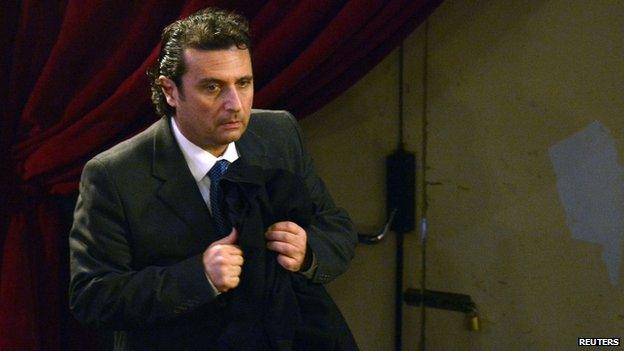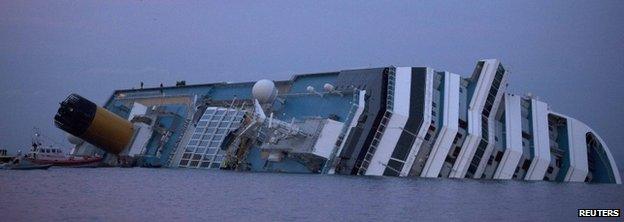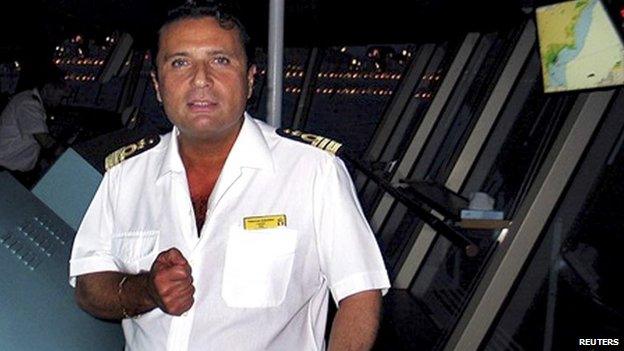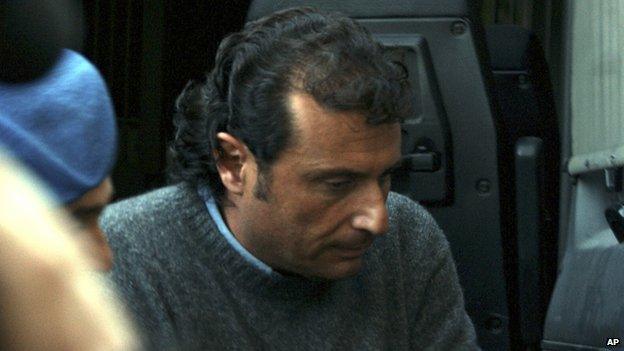Captain on trial: Costa Concordia's Francesco Schettino
- Published

Capt Schettino maintains that he saved lives by steering the stricken ship to shallow water
Capt Francesco Schettino has been found guilty of multiple manslaughter in Italy and sentenced to 16 years in jail for his role in one of the country's worst maritime disasters.
Thirty-two people died when the cruise ship hit rocks off the Tuscan island of Giglio in January 2012 and tipped on to its side.
Capt Schettino was also convicted of causing the shipwreck and abandoning ship before his passengers, earning him the title "Captain Coward" in the Italian media.
He has accepted some responsibility but denies the criminal charges, arguing that he has been made a scapegoat for the tragedy.
While a prosecutor condemned him as a "careless idiot", Capt Schettino has long maintained his actions after the ship ran aground prevented a much greater loss of life.
Born in 1960 in the southern coastal town of Castellammare di Stabia, near Naples, Capt Schettino has lived a life dominated by the sea.
He attended a nautical institute in the nearby town of Piano di Sorrento and then joined Costa Cruises in 2002, initially as an official in charge of security.
In 2006, he was promoted from second-in-command to captain.

Disaster timeline

13 Jan 2012: Costa Concordia runs aground
Oct 2012: Capt Schettino appears at court inquiry
Jul 2013: Capt Schettino goes on trial for multiple manslaughter and abandoning ship
Jul 2013: Five crew jailed for manslaughter for up to two years and 10 months
Feb 2014: Capt Schettino returns to ship as part of trial
Jul 2014: Costa Concordia refloated and towed to Genoa
Nov 2014: Remains of last victim Russell Rebello found in wreck

Evacuation chaos
Capt Schettino was singled out for blame by the official report into the sinking of the Costa Concordia, almost a floating city with its 4,300 passengers and crew members. It alleged he deliberately changed course to perform a risky night-time sail-past salute to people on the tiny island of Giglio.
He told his trial he "wanted to kill three birds with one stone": to please the passengers, salute a retired captain on Giglio and do a favour to the vessel's head waiter, who was from the island. He has rejected rumours that he had wanted to impress his lover, Domnica Cemortan, with him at the helm.
As details of the unplanned change of course emerged, ship owner Costa Cruises distanced itself from the captain who, it said, had made "serious errors of judgement" and carried out a manoeuvre "unauthorised, unapproved and unknown to Costa".
The captain told the court that he had been been sacrificed to safeguard "economic interests", arguing that the court should be considering an entire organisation rather than one man.

Francesco Schettino was made captain in 2006
In a TV interview given hours after the ship ran aground, Mr Schettino's shock and disbelief was clear as he told reporters the rocks had not been shown on his charts.
"We were about 300 metres from the rocks, more or less, we shouldn't have hit anything."
Widely vilified in Italy for leaving his ship while passengers were still on board, Capt Schettino's reputation was further damaged when transcripts suggested he had not told the coastguard initially of the gravity of the damage to the ship.
"Listen Schettino, perhaps you have saved yourself from the sea, but I will make you look very bad. I will make you pay for this. Dammit, go back on board!" says Coastguard Capt Gregorio De Falco, repeatedly ordering him to return to the ship.

Capt Schettino was arrested after the Costa Concordia sank
Speaking by radio from a lifeboat, Capt Schettino said he was co-ordinating the rescue from there, pleading at one point: "Do you realise that it is dark and we can't see anything?"
The coastguard shouts back: "So, what do you want to do, to go home, Schettino?! It's dark and you want to go home? Go to the bow of the ship where the ladder is and tell me what needs to be done, how many people there are, and what they need! Now!"
A taxi driver who says he took the captain to a hotel the morning after the sinking said the captain had asked only where he could buy some socks.
Costa Cruises CEO Pier Luigi Foschi: "He [the captain] decided to change the course of the ship"
"He looked like a beaten dog, cold and scared," the taxi driver said.
Capt Schettino has accepted some degree of responsibility, asking for forgiveness in a television interview in 2012 as he talked of those who died.
He said he blamed himself for being "distracted" but said that he had not been on the bridge when the ship ran aground.
In the interview, he broke down when asked about the youngest of the 32 victims, a five-year-old girl.
As the accusations against Capt Schettino grew, there were those who came to his defence, including sailors, who agreed with his assertion that his decision to steer the ship towards shallower waters had probably saved dozens of lives.
His defence lawyers accused the prosecution of focusing on him while offering plea bargains to five co-defendants, jailed in July 2013 for up to two years and 10 months.
According to an interview in Naples-based Il Mattino newspaper quoting his sister, the first person Capt Schettino called after the incident was his 80-year-old mother, Rosa.
"He called her at five in the morning on Saturday to tell her there had been a disaster, that he had tried to save as many passengers as possible and not to worry, because it was all over," she said.
As he asked for a 26-year sentence, prosecutor Stefano Pizza listed all the mistakes Capt Schettino had made and said: "May God have pity on Schettino, because we cannot."
